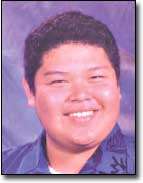Kauaians have collected upwards of 400 signatures on petitions requesting county officials to set up more recycling bins outside island supermarkets. Inspired by what they learned through trips to Japan, California and other locations, the Rev. Noriaki Fujimori, pastor of
Kauaians have collected upwards of 400 signatures on petitions requesting county officials to set up more recycling bins outside island supermarkets.
Inspired by what they learned through trips to Japan, California and other locations, the Rev. Noriaki Fujimori, pastor of Waimea Higashi Hongwanji, and others, are looking for ways to make it easier for people to recycle on Kaua’i.
“Now is the time for us to change our wasteful-way lifestyle so that we may preserve this beautiful island of Kaua’i,” Fujimori said.
The petition drive seemed a logical extension of the hongwanji’s Environmental Awareness Project, he said.
In Japan, the waste stream has been reduced to a trickle, with recycling bins for items like newspaper, aluminum, glass, plastic and other commodities lining sidewalks outside virtually every grocery store in the country, he added.
“You know, if we didn’t finish our food, they didn’t throw it away or put it down the disposal. They used it as fertilizer,” said Brycen Hiraoka, a Kekaha resident and son of Bruce Hiraoka.
Brycen Hiraoka went to Hokkaido on an exchange tour, one that opened his eyes about how the Japanese recycle, and how residents of the United States, Hawai’i and Kaua’i lag in these efforts.
“Speaking of recycling food, that isn’t the only thing that the Japanese recycle. They reuse everything,” Hiraoka said.
“They recycle cans, newspaper, glass and cardboard. I think that Japan is the leading country in recycling.
“Our country is so poor that we hardly recycle. We still throw away everything that we use,” said Hiraoka.
“We always think that there will always be more new things to use, but the truth of the matter is one day we will not have anything to use, all because our country doesn’t enforce recycling.”
Fujimori, who composts in Waimea but admits he like many other Kauaians routinely tosses in to trash receptacles glass bottles and plastic drink containers he knows can be recycled, still sees Japan as a place to get ideas to increase recycling on this island.
“When we visited Japan, we saw many recycling bins in front of grocery stores, schools, playgrounds,” he said.
“Some Japanese also carry their own bags instead of taking plastic bags at the grocery store. We realize now that we are very poor at recycling,” said Fujimori.
If small towns like Yamaoka in Gifu prefecture can and do recycle, there should be no reason Kaua’i residents and visitors cannot, he reasons.
“It’s a big goal,” said Fujimori.
“As Brycen pointed out, we need to learn more about the environmental problems, and must change our lifestyle step by step in order to keep this precious earth for the young people and all living beings.
“Therefore, some young members and I have decided to start to learn more about the environment locally and become leaders for the community regarding the environment,” Fujimori stated.


